SAWeekend: How an innovative, SA-based bee project could change the face of agriculture
Cashing in on pollination is one of a myriad of agricultural projects emanating from an innovative investment company which is also helping keep the brightest young talent here in SA
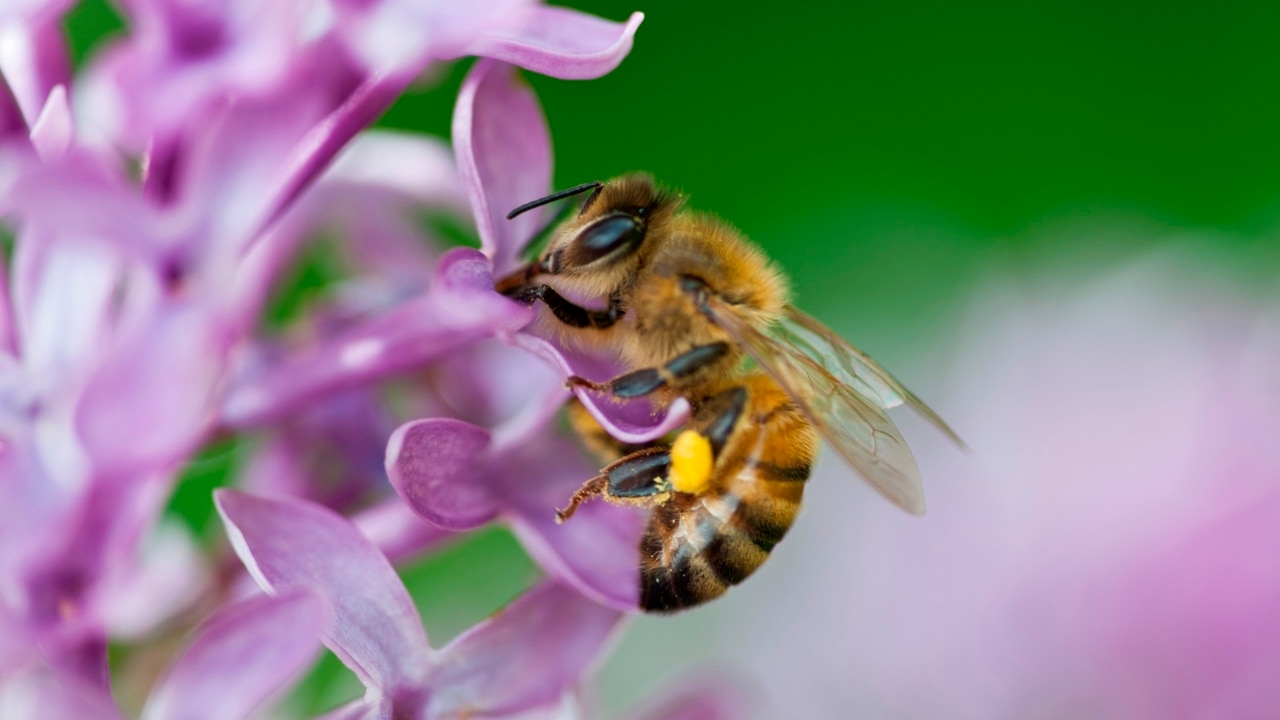
They are among the hardest workers in the Australian agriculture sector, but like many quiet achievers, their contributions go largely unsung. Originating from Europe, they move in groups, huddling together in purpose-built accommodation, their communication heavily reliant on pheromones and dance.
No, they’re not backpackers; they are European honey bees, and they’re the focus of one of a bunch of innovative agricultural projects being run out of an old mansion in the Adelaide Hills.
Chuck a left down Pomona Road, just before you head into Stirling off the freeway, and Duxton House is pretty much the first place you’ll see. A stately old mansion, apparently once owned by “Mimi” – the proprietor of Adelaide’s first lingerie boutique (a story for another time) – it’s a beautiful Victorian villa converted into an office, with a modern glass-covered extension to the rear. It’s impressive but hardly stands out from the other stately homes in the area.
It’s what goes on inside the “house” which is interesting, and has the potential to not only generate some serious wealth for the state but to build new industries, revitalise the old and create enriching, well-remunerated jobs for a new generation of bright young things.
It’s not just bees, by a long shot. Duxton is about the fifth-biggest wine grape grower in Australia and the second-largest walnut grower, and has substantial holdings in apples and beef. It also runs two listed companies involved in water trading and broadacre farming. And after plenty have tried and failed, it’s taking on the dried fruit sector, which large Australian producers have failed to make a serious go of in recent years.
But there are a couple of lads still only approaching their mid-20s who tell me they reckon they have the goods to make it work.
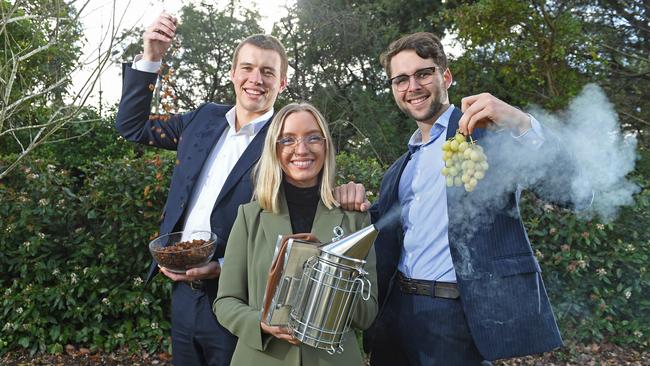
And 25-year-old investment analyst Jessica Gricks tells me she could talk about bees all day. It’s a different tack to the work she was doing in her previous role at property firm JLL – and to the layperson probably a lot more interesting.
It’s also an opportunity for all of these young people to run their own show: to formulate an investment thesis, put together a proposal, pitch it to the Duxton leaders and then take it on the road, getting investors on board. And it’s a chance to build something, and to do it here in South Australia.
Art is everywhere in Duxton House. Perhaps not surprisingly, as Ed Peter, chairman and founder of Duxton Asset Management, paints, draws, and plays the sax when he’s not thinking of interesting ways to invest. In keeping with the business’s focus, the art is almost entirely agriculturally themed, and as Peter explains, each one represents a success: a deal finalised, an investment executed.
South Australians might know a little about Peter from his occasional mentions in the media as the owner – with wife Julie – of the Uraidla and Crafers hotels, and the building we now know as the 2KW building. He also recently invested in The Lion in North Adelaide as well as a couple of country pubs, and has ambitions for more.
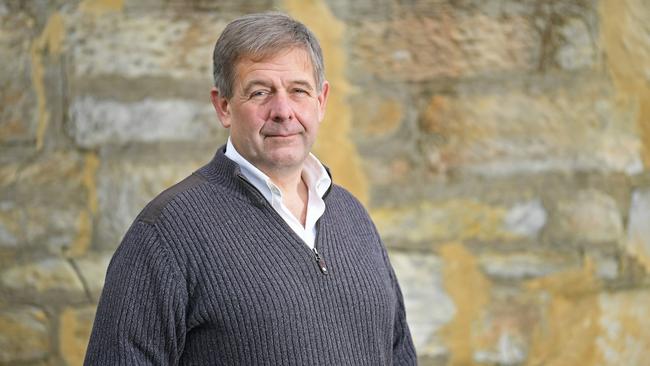
Peter ended up in Adelaide after fatefully asking Julie what she wanted as a gift for their 20th wedding anniversary. To return home and build a life for them and their four children in the Adelaide Hills was the answer. After recovering from the initial shock, Peter jumped in with both feet and now has deep roots in SA, with several investments, including a stake in Kaesler Wines and positions on the University of Adelaide’s agribusiness and wine advisory boards. He was formerly on the board at Wine Australia.
Peter started his career in 1986 in equity sales for Credit Suisse in Geneva, and joined Deutsche Bank in 1999, before founding Duxton, now spread across Singapore and Adelaide, in 2009. He describes the business’s investment philosophy as “boringly long-term”.
It’s currently focused heavily on food, and with agricultural land continuing to disappear globally, and the world’s population continuing to grow, the agriculture investment thesis is simple and compelling. But if it were that easy, everyone would be doing it – and succeeding. And they aren’t.
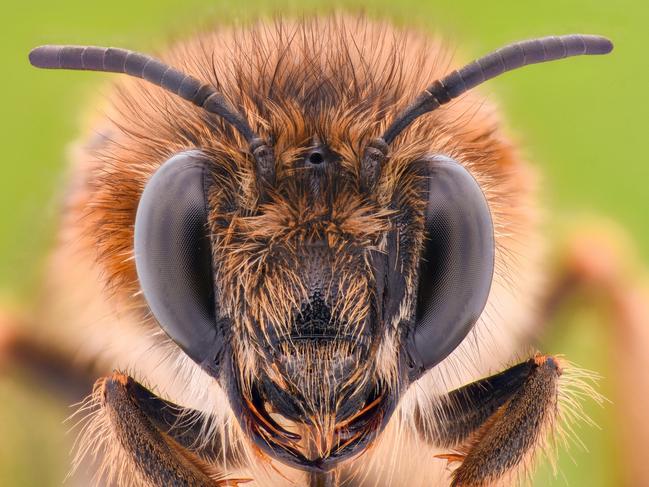
You’d probably think the investment pitch around honey bees would be around, well, honey. But you’d be wrong ... mostly.
Drive around the Adelaide Hills and many of our other agricultural areas and you’ll often see a cluster of beehives perched at the edge of a field. You’d be forgiven for thinking that a farmer is earning a little bit of extra coin by making honey, or allowing a beekeeper to benefit from the particular flavour imparted by their crops.
But in fact honey bees are integral to some crops’ very existence, and benefit many others, through pollination, without which crops such as apples and almonds simply can’t be grown.
According to a report compiled for the Senate in 2014, the contribution of pollination services to crop production could sit as high as $4-$6bn, while honey and other hive products such as wax generate only $70-$90m a year.
But as Jessica Gricks explains, pollination services is very much a cottage industry, highly fragmented and operated by owners who, for the most part, are not of a corporate bent.
“Globally, honey bee populations are declining,” she says. “Various studies have shown that honey bee populations in Europe have declined by 50 per cent since 1980 and we’ve seen similar trends in Australia.”

The ageing demographic of farmers and the increasing use of pesticides are two major reasons for this decline. And while bee numbers have been plunging, there has been a corresponding but increasing need for pollination services as agriculture expands.
Gricks says the prices people are willing to pay for pollination services have already started to creep upwards in Australia, but have increased dramatically in the past three to five years in the US. Duxton set out to tie these opposing forces into an investment proposition which would bear fruit (pardon the pun).
“The initial idea (for Duxton) came from almond pollination,” Gricks says. “The number of almond plantings has increased from around 3500 hectares in the year 2000, and today we’re at more than 50,000ha.
“If you look at the growth of honey bee populations over that period it’s not corresponding.’’
And if you look at the name of some of Duxton’s other asset vehicles – Duxton Nuts, Duxton Vineyards, Duxton Dried Fruits – you can see the company has not only a close insight into the demand for the service, but an opportunity to act as its own customer for a pollination service.
But unlike most beekeepers who might run a few hundred hives, Duxton has its sights set on being the biggest pollination services provider in the nation.
“We already know that there’s going to be a shortfall of 125,000 hives for next year’s pollination season, and there’s 675,000 hives in Australia, so it gives you an idea of just how big that shortage is, and it will continue to grow,’’ Gricks says.
While the average pollination services provider in Australia runs only about 400 hives, in the US some firms run more than 80,000 hives. “Certainly our long-term goal is to get to that level,’’ Gricks says. As the lead on the Duxton bee business, Gricks has travelled the nation, pitching the idea and raising funds to kick off what has been a greenfield development.
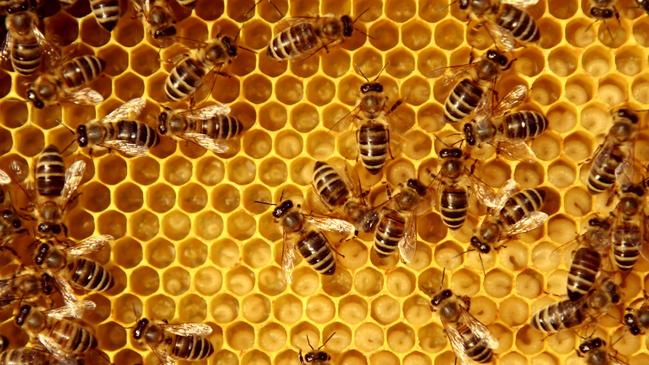
The financial modelling which underpins the idea was her responsibility, and now managing and allocating the capital will fall to her, as well as returns and shareholder relations.
A 1200ha site at Euston, NSW, about 40 minutes out of Mildura, has been selected to start the project, and moves are afoot to start building up the company’s bee stock, with aspirations to also move into bee bloodstock breeding once the operations are on a firm footing.
The main revenue streams will be pollination services, but there will also be honey and wax, and queen bee breeding and exporting, with Australian bees highly sought after overseas. This is because Australian bee colonies have largely remained untouched by some of the diseases which have led to a collapse in bee numbers elsewhere in the world.
Conveniently, the launch site abuts Duxton-owned vineyards, providing a win-win for the business. And for Gricks, it’s an opportunity the likes of which would be hard to find elsewhere in SA. As well as running her own project, like many of the team at Duxton she is a backup on another three within the Duxton portfolio, providing the ability to learn and cross-pollinate ideas.
Gricks says Ed Peter is willing to give people a shot, even if they’re a bit green – as evidenced by the young average age of the analyst team out the back – and she would undoubtedly be working interstate if not for the Duxton opportunity.
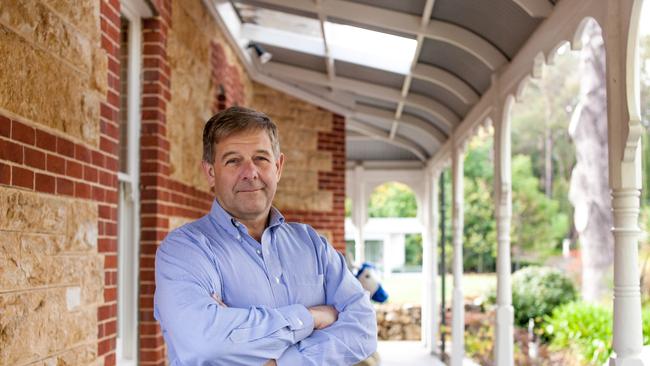
Peter is a scholar of the financial markets. On his desk there is a framed picture of a prospectus from September 1990, which invites investors to lock away their money for terms of three months to four years, for a staggering 17.6 per cent return per annum.
It’s a reminder that the cost of money underpins every investment thesis, and that flux in the financial markets is a constant. He’s interested in plenty of asset classes, but the decision to focus on agriculture is based on a sweeping theme.
“Why are we in ag? Because we’re destroying agricultural land so fast it’s not funny,’’ he says.
And while there have been huge productivity gains over his lifetime – 270 per cent – the gains to be made from here will be hard won.
“If you go back to biblical times, what you’ll find is that land holds value,’’ Peter says. “In fact, if you look at modern economic history going back 600 years, agricultural land has outperformed any other asset class over a long duration and you get a yield. The destruction of ag land is off the charts.”
And it’s not just destruction; it’s degradation, with 8 per cent of US agricultural land yielding less than half that of 25 years ago, due to nitrate-based fertiliser use.
But the investment thesis is not just buy and hold – and if this sort of investment were easy, why are companies in areas such as dairy and dried fruits failing? And why can Duxton make a go of it?
A big part of it is the model. Executives such as chief financial officers can work across the sweep of Duxton’s projects, managing a handful at a time, rather than each entity ramping up its costs with a dedicated executive team. And there are other economies of scale.
By owning huge swathes of vineyards, almond orchards and fruit orchards – often in the same regions – there are deep discounts available on inputs such as fuel. And then there’s what you might call the human capital. The Jessica Grickses and the James Moriartys and the Nicholas Parlettas.
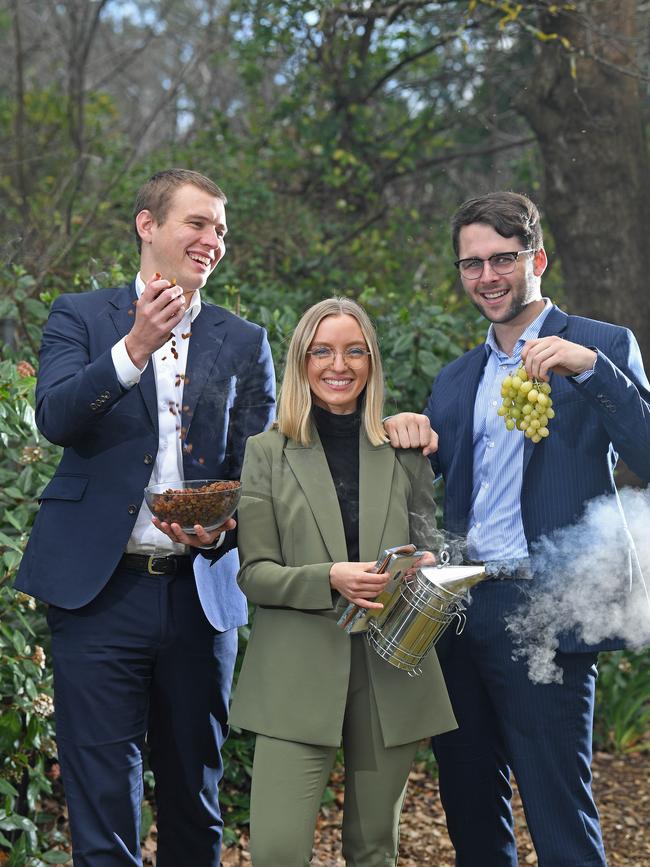
Moriarty and Parletta have the sort of CVs which would make them strong contenders for employment at any of the big four accounting firms or investment banks across Australia. House captains at Prince Alfred and St Peter’s colleges respectively, both were academic prize winners in economics at high school and high achievers in the sporting realm, and both went on to complete commerce degrees. Moriarty also picked up a law degree.
And at just 24 years of age, they are looking to win in an industry where many have failed before them. The questions is, what do they – and Duxton more broadly – think they know which will give them the ability to not just survive but thrive, growing and selling dried fruit, when global investors have pulled out of Australia in recent years?
Parletta is a fast talker, and clearly energised about taking on the challenge. And it’s a tough pitch.
“Over the past 25 years we’ve seen production in Australia come down quite significantly,’’ he says.
“The key drivers have been pricing in the domestic space but also significant competition for prime horticulture land, which is suited to things like almonds, table grapes and citrus. For dried fruits, the economics just haven’t stacked up for small growers.’’
So far it sounds like a great idea not to get into the field. But Duxton believes it can do things better. The good news is consumption has remained strong, albeit supplied increasingly by imports. Moriarty says that in the mid ’90s Australia was producing about 90,000 tonnes of product annually, which has dropped to about 20,000 tonnes.
“A lot of it is has been because of the dynamics of how the industry started,” he says. “A lot of it was post-war allotments ... small parcels, and over the drought it has become really hard for those small growers to compete and be viable, with high water prices.”
Farmers have been selling off their farms and water rights, or moving to other products, Moriarty says. But Duxton says there is a desire to buy local, and there is a large Australian entity which is willing to take their product.
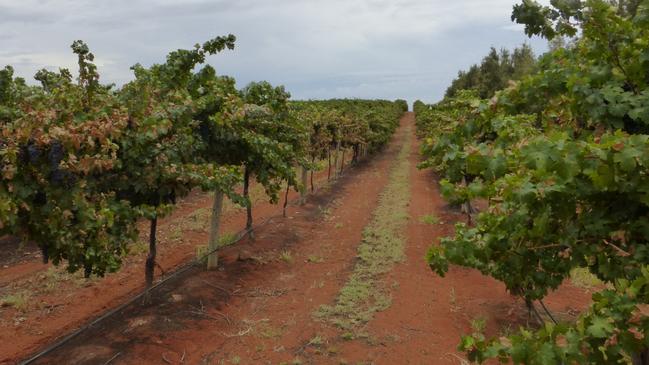
“We went to them and said we have the expertise to put together a proposal, which ultimately led to planting out of new dried fruit vineyards, which we are then selling (the fruit) to them, and they also look to export some of that as well,’’ Parletta says.
Duxton, as one of Australia’s largest wine companies – with about 2500ha of plantings – owns a large number of vineyards in the Mildura area and was able to convert adjacent disused land to orchards.
The company employs about 15 people regionally on the dried fruit project, and with economies of scale across the entire Duxton portfolio on things such as water, logistics, fertiliser, fuel and management costs, and sheer farm size, the economics stack up.
“That’s the key point of difference,” Parletta says. “The average farm size in the dried fruit industry is about 10ha. When we get up to full production we’ll be north of around 500ha.”
And with the buying and back office support of Duxton “we’ve been able to give our investors the benefits which a much, much larger business is able to get’’.
Parletta has been working on the project since mid-2016, and has helped take it from a concept to first planting in 2018. He continues to manage it, with the Duxton team, towards full planting in the next three years. For both young men, being able to do this sort of work in SA, rather than having to move east or even overseas, has been a welcome surprise.
“We’ve both been fostered very much through Duxton,’’ Parletta says. “I worked through university as an accountant and came over to Duxton on an internship, which then turned into a full-time position, which I think is really unique in the SA market, the type of work we do here.’’
Parletta says, after being mentored by another investment manager, he is now leading two “quite large” projects with oversight from the executive team.
“But I’ve been given a lot of scope which I think has been really exciting for me.”
And as well as being able to do a job which normally would have demanded an interstate move, both say the culture at Duxton – where anyone can pitch an idea and, if it stacks up, have a crack at making it work – makes it exciting.

